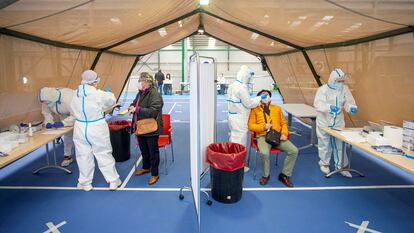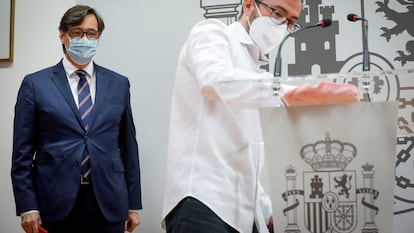Majority of Spaniards will not get coronavirus vaccine without knowing the effects, poll finds
According to a survey from the CIS research institute, 16.7% of those questioned would not get immunized under any circumstances

Spaniards are very interested in the upcoming coronavirus vaccines. Eight in 10 people have recently sought information about their development, according to a survey that was published on Friday by the state-funded CIS research institute.
A third, meanwhile, are willing to get the vaccine as soon as possible, but the majority – 55% – want to wait to see what effects it has before they opt to be immunized. Of these, 59.6% would get vaccinated immediately if their doctor recommended them to do so based on their medical history or due to the risk of infecting a relative.
At the other end of the scale, 16.7% of those surveyed responded saying that they would not get vaccinated “under any circumstance,” not even if their doctor recommended it.
Based on these poll results, the vaccine – which in principle will be voluntary – would cover approximately the number of people considered necessary to reach so-called “herd immunity,” cited by the scientists to be between 60 and 70%. The government has already announced a communication plan in order to increase the percentage of the population that opts for the vaccination, but no details of this have been made available yet.
Most undisciplined
A total of 2,131 people participated in the survey, which sought to measure the effects of the coronavirus among the Spanish population and their opinions on the measures being put in place in order to combat it. When asked about which section of the population is being the most undisciplined in terms of the coronavirus rules, 62.4% cited young people, followed by just 11.6% who said that all groups are being undisciplined.
In terms of how the pandemic has affected day-to-day life for those surveyed, the most common response was in relationships and way of life (49.8%), followed by emotional, work and financial aspects, things that were cited by approximately four in every 10 people polled.
Health minister: 15-20 million people could be vaccinated by mid-2021

“We estimate that we will begin the vaccination campaign at the start of January, although we still don’t have a specific date,” he said. “Spain will be prepared so that when the first doses arrive, we can start to administer them.”
The minister also reiterated the government’s message about the dangers of mobility during the holidays coming up on December 6 and 8 (observed only on Tuesday in some regions, and on Monday and Tuesday in others), recommending that “the less movement, the better,” as a way to stop the spread of the coronavirus.
English version by Simon Hunter.
Tu suscripción se está usando en otro dispositivo
¿Quieres añadir otro usuario a tu suscripción?
Si continúas leyendo en este dispositivo, no se podrá leer en el otro.
FlechaTu suscripción se está usando en otro dispositivo y solo puedes acceder a EL PAÍS desde un dispositivo a la vez.
Si quieres compartir tu cuenta, cambia tu suscripción a la modalidad Premium, así podrás añadir otro usuario. Cada uno accederá con su propia cuenta de email, lo que os permitirá personalizar vuestra experiencia en EL PAÍS.
¿Tienes una suscripción de empresa? Accede aquí para contratar más cuentas.
En el caso de no saber quién está usando tu cuenta, te recomendamos cambiar tu contraseña aquí.
Si decides continuar compartiendo tu cuenta, este mensaje se mostrará en tu dispositivo y en el de la otra persona que está usando tu cuenta de forma indefinida, afectando a tu experiencia de lectura. Puedes consultar aquí los términos y condiciones de la suscripción digital.









































